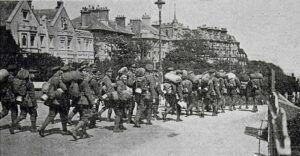In the Anglican Church of Canada, we do not mark an official “Season of Remembrance”. Yet each November naturally takes on that character as we gather for All Saints and All Souls, and then pause as a nation for Remembrance Day. It is a time when the church gently invites us to consider the meaning of memory, of the saints who have gone before us, the faithful departed, and those who gave their lives in war.

So perhaps this is a good time to ask ourselves: what does it mean to remember someone? For me, remembering someone often means remembering my older brother Simon, killed in a motorcycle accident on 1st April 1998 (you don’t forget those dates, do you). I remember him telling me that being without his motorbike was like being without his essence. That was who he was, and how he felt alive, and how he met his end. I also remember my grandmother, who had first-hand memories as a 15-year-old girl watching “those handsome young men” (as she put it) proudly marching down the hill in 1917 to board the ships to France. “Oh, they were so good looking,” she recalled, smiling. Then her face would change. “What they had not seen,” she declared, her expression quite altered, “were the men on those same ships arriving back from France, blind and broken.” Her words carried the weight of both pride and sorrow, a mingling of admiration for their courage and grief at the terrible cost.
Scripture has much to say about remembering. In dark times, the people of the Old Testament were asked to “remember that you were slaves in Egypt and that the Lord brought you out with a mighty hand and outstretched arm” (Deuteronomy 5:15). Memory was a way of keeping their identity alive. It worked both ways, because at the same time they are told that God will remember His promise made to them (Leviticus 26:45). In the Gospels, we see the thief crucified alongside Jesus asking, “Remember me when you come into your kingdom.” Whereupon the thief is immediately reassured: “today you will be with me in paradise” (Luke 23:43). The most poignant and powerful of these ‘remembering’ passages tells us of Jesus sharing his last meal with his friends, when he “took bread, gave thanks and broke it, and gave it to them saying, ‘This is my body given for you; do this in remembrance of me’” (Luke 22:19).
On all of these occasions, remembering is much more than just a simple recollection of information about the past. It is remembered in such a way that the facts remembered have some impact on the present. In particular, remembering God makes Him present in a distinctive and moving way. To remember is to allow the past to become alive in the present, shaping our faith, strengthening our resolve, and reminding us of who we are. Remembering does not seek to keep us anchored to the past; it transforms, motivates and uplifts.

(That’s Stewart’s eldest daughter Heidi on the bike)
So, again, what does it mean to remember, and what do such memories do to us? The use of memory to somehow bring a person or a good time back serves only to anchor us in the past and, in so doing, prevent us from living in the present. I could be embittered by the sudden loss of my brother and decide to discourage all that I meet from riding motorbikes. But instead, I choose to remember his infectious joy when he returned from a particularly inspiring ride across the North York Moors in England, the landscape that was his home. That joy is something worth holding on to. My grandmother remembered all the soldiers she had seen, both the handsome and the broken. She spoke of both with equal respect. Later in life, she was an advocate of peace, both between countries and within families.
As we stand in silence on Remembrance Sunday, will we be incensed at the loss of so many young lives, or inspired by their selflessness and sacrifice? When we hear the bugle sound the Last Post, when we place our poppies, when we whisper a prayer in church for a loved one long departed, what stirs within us? Remembering our friends and family members, and those who gave their lives in war, should not be an act that ties us to the past, holding us back. Rather, it should be something that motivates us here and now to look ahead, transformed by the work they did in us and for us.
And in that way, God, and in so many ways our friends and family, now invisible, can lift us, inspire us, and give us hope and strength. To remember faithfully is not to dwell in the shadows of yesterday, but to allow yesterday’s light to illuminate today and guide us toward tomorrow.

Disability Theology and it’s Promise for our Church